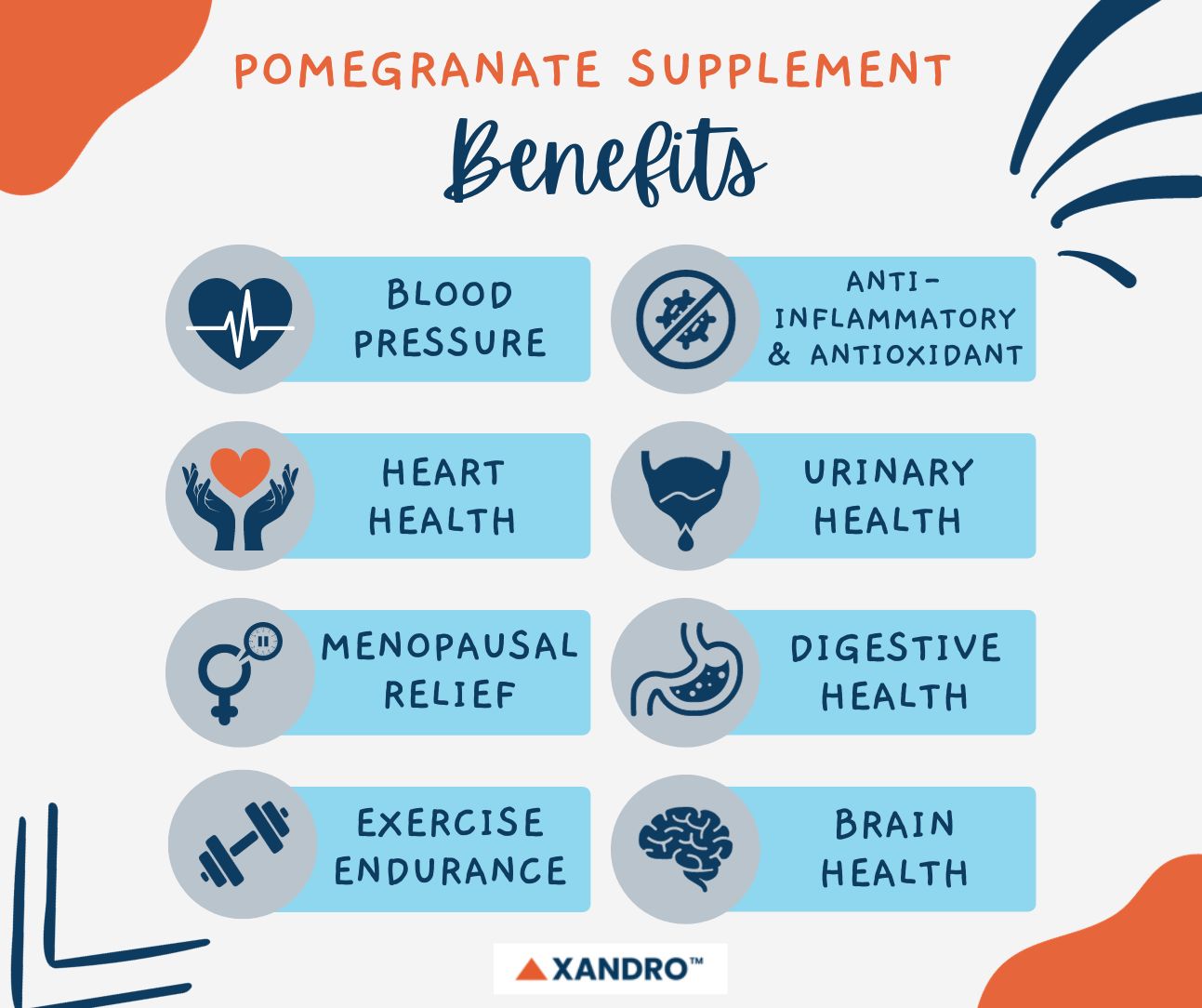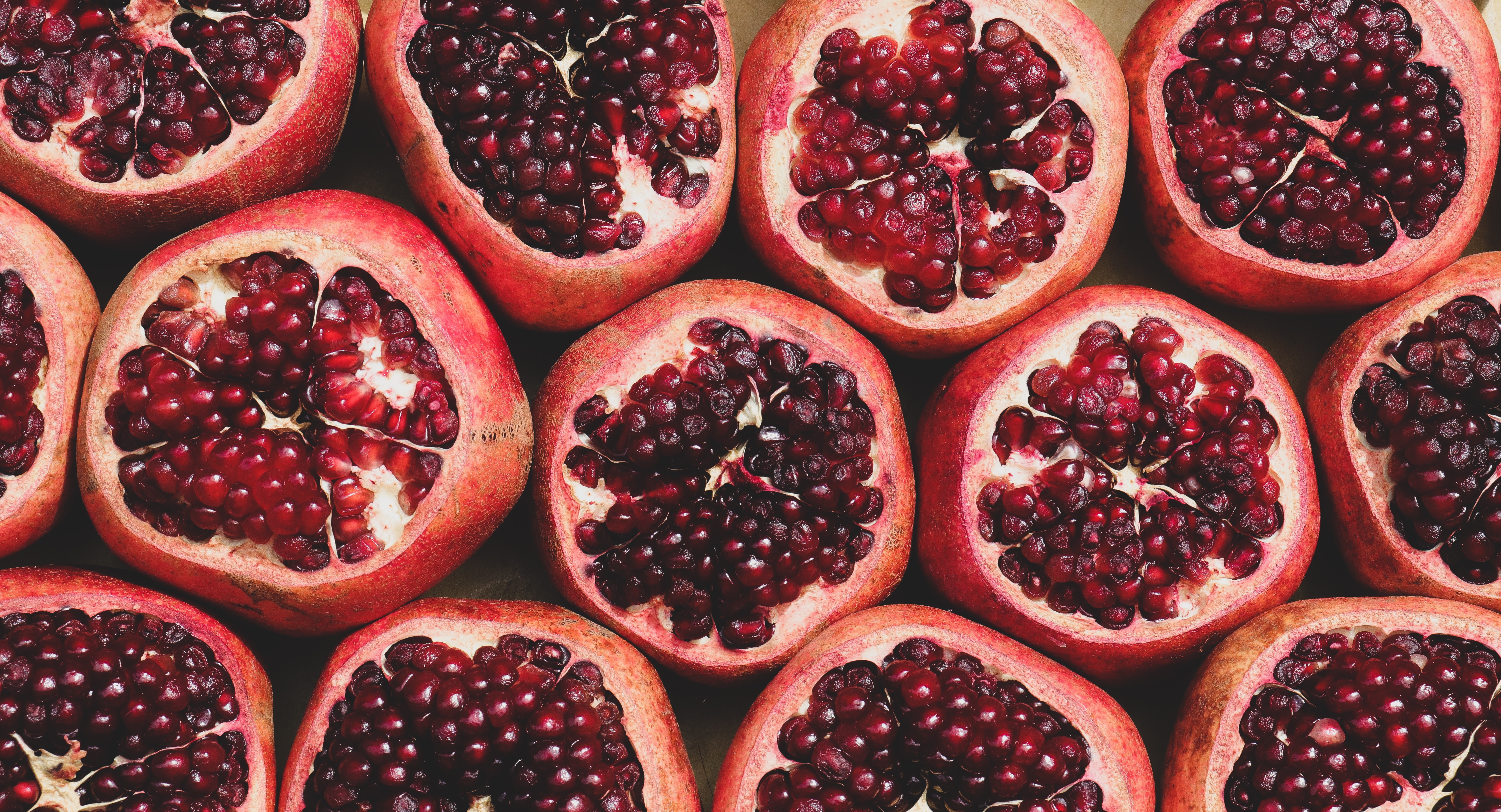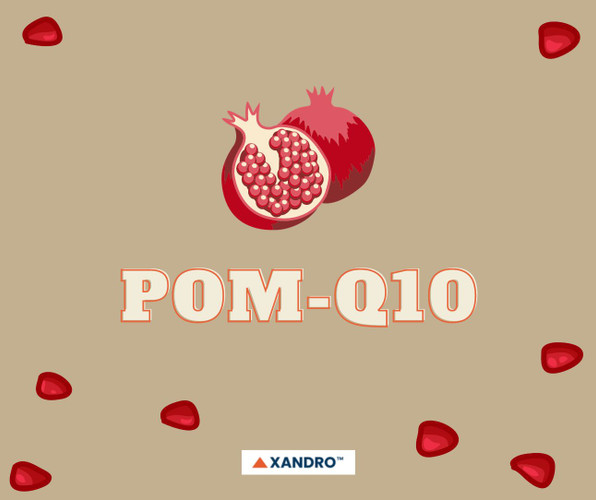The Benefits of Pomegranate Supplements
7th Jan 2024
The Best Pomegranate Supplement and its Benefits
Pomegranate supplements have been traditionally used in many cultures and is found in Greek, Hebrew, Buddhist, Islamic and Christian mythology and writings. Some of the first records, dating from around 1500 BCE, describe it as a treatment for tapeworm and other parasites.
Regarding pomegranate extract vs juice, pomegranate extract is made from both the seed and peel, whereas pomegranate juice is made by juicing the fruit.
What Are Pomegranate Supplements Good For?
Pomegranate supplements' benefits are wide and varied, but they’re often used to help with high blood pressure, athletic performance, heart disease and diabetes, and contain a variety of chemicals that are thought to have antioxidant effects.
High Blood Pressure
People often take pomegranate supplements for high blood pressure. This is because pomegranate juice may help lower systolic blood pressure by about 5 mmHg, as well as diastolic blood pressure. For those with low blood pressure already, pomegranate juice may drop this to a level that’s too low. This may also interfere with blood pressure control during and after surgery, so stop taking pomegranate at least two weeks before a scheduled surgery. In terms of pomegranate supplement dosage for high blood pressure, it’s been recommended to take 43–330ml of pomegranate juice daily for up to 18 months.
Anti-Inflammatory and Antioxidant
Pomegranates may help prevent inflammation associated with conditions like heart disease, type 2 diabetes and cancers.
Pomegranates are high in antioxidants which can help protect cells from free radical damage and prevent diseases.
Heart Health
Pomegranates are rich in polyphenolic compounds, which are shown to benefit heart health. One study found that in people with heart disease, drinking pomegranate juice helped reduce the frequency and severity of chest pain. Another study of healthy men found that pomegranate juice may decrease the likelihood of LDL and improve HDL, the good cholesterol.
Urinary Health
A study found that pomegranate juice could prevent the mechanism that causes kidney stone formation in those with recurrent kidney stones, while an animal study found that pomegranate extract could regulate the concentration of oxalates, calcium and phosphates in the blood, which are common components of kidney stones.
Anti-Cancer Properties
Animal studies have found that pomegranate may help slow tumour growth in the early stages of liver cancer and may benefit prostate cancer, but speak with your doctor before taking it as high antioxidants in the late stages of cancer may actually promote tumour growth.
Exercise Endurance
While more research is needed, the polyphenols in pomegranates may increase exercise endurance, with one study finding that pomegranate extract increased time to exhaustion and improved performance in trained cyclists. Research has also found that pomegranate supplements may improve endurance and muscle recovery, although this is not yet found if only drinking pomegranate juice.
The polyphenols also give pomegranate benefits for weight loss, as they can boost metabolism and increase fat burning.
Brain Health
Some of the antioxidants in pomegranates, known as ellagitannins, may help protect the brain from Alzheimer’s and Parkinson’s disease by reducing oxidative damage and increasing the survival of brain cells.
Digestive Health
Pomegranates may support the health of our gut microbiome, possibly increasing levels of good gut bacteria, meaning it may have prebiotic effects. Pomegranate arils are also rich in fibre, which is needed for digestive health.
Menopausal Relief
A 4-week study found that treatment with these supplements significantly reduced various menopausal symptoms, even for those who stopped taking menopausal medicine during the trial. This includes improvements in sweating, hot flashes, insomnia and other symptoms like nervousness, melancholia, vertigo, fatigue, headaches, formication, sexual complaints and urinary tract infections. The research also suggests that pomegranate supplements may enhance the vasomotor, psychological, physical and sexual aspects of menopause-related quality of life.

How POM-Q10 May Benefit You
Other than the benefits mentioned above, POM-Q10 also contains two other beneficial ingredients: Amla Fruit Extract and Coenzyme Q10. Let’s go over amla fruit extract benefits and Coenzyme Q10 benefits:
Further Reading: How Do COQ10 Supplements Work?
Heart and Circulatory Health
If a person has poor cardiovascular health, this can limit their involvement in usual daily activities. POM-Q10 can effectively address these concerns by improving cardiovascular health, especially for runners striving for peak performance. Coenzyme Q10 may also support cardiovascular functions and it is needed for energy production in cells.
Antioxidant and Anti-Inflammatory
POM-Q10 is a powerful antioxidant that provides relief from inflammatory responses and migraines. Other than the pomegranate properties mentioned above, amla benefits also include its antioxidant properties while coenzyme Q10 is a lipid antioxidant that has the potential to reduce oxidative stress.
Skin Health
Xandro Lab’s POM-Q10 helps reduce visible signs of skin aging. It reduces wrinkle severity, improves skin smoothness and positively affects the skin microbiome, with the coenzyme Q10 also enhancing skin health. A study found that taking CoQ10 limited seasonal deterioration of viscoelasticity of skin and helped with clear skin by reducing some visible signs of skin aging after 12 weeks of supplementation.
Physical Performance
You may also experience increased physical performance when taking POM-Q10. A study found that taking 90mg/day of coenzyme Q10 (CoQ10) supplementation for 6 weeks showed improvement in the performance of 25 Finnish top-level cross-country skiers. It’s also shown improvements in the physical performance index, VO2Max, anaerobic and aerobic threshold, and lactic acid clearance.
Blood Sugar Levels
Other than helping to maintain our metabolic balance, the Amla fruit extract may help blood sugar levels. A study found that taking of 1, 2 or 3g of amla powder daily led to a decrease in fasting and post-prandial blood glucose levels by the 21st day. It also found improvements in high-density ‘good’ lipoprotein-cholesterol and lowering of low-density ‘bad’ lipoprotein-cholesterol levels in the volunteers.
Pomegranate juice is high polyphenols, anti-diabetic compounds and dietary fibre, which makes it great for controlling blood sugar levels. It contains a low GI and GL, making it beneficial for those with high blood sugar levels.
What makes POM-Q10 better than other pomegranate supplements? It has the highest concentration of amla (Indian gooseberry), pomegranate and Co-Q10, as studied in various scientific studies.
How to Take POM-Q10?
Dosage of POM-Q10: Xandro Lab’s Pom-Q10 combines 700mg of Amla (Emblica officinalis) Fruit Extract, 400mg Pomegranate (Punica granatum) Fruit Extract and 50mg Coenzyme Q10.
In terms of how many mg of pomegranate extract to take each day, while there is no set recommended dosage, one study found that 600mg/kg body weight per day was highest dose tested of a standardised pomegranate fruit extract that found no observed adverse effects.
Coenzyme Q10 dosage is recommended at 90 to 200mg per day, but this depends on what you’re taking it for.
In terms of amla dosage per day, many studies use between 500mg and 3g of amla extract, with dosage often between 500–1000mg daily.
When should I take pomegranate capsules? Take at breakfast or at lunch. Some researchers have found that taking pomegranate extract 30 minutes before exercise may enhance blood flow and delay fatigue during exercise.
How to Use POM-Q10: Take two capsules each day, preferably with food.
Who Should Not Take Pomegranate Supplements?
Pomegranate supplements' side effects are nearly non-existent unless someone has an allergy to pomegranate. Despite this, some people have experienced sensitivity to pomegranate extract, such as itching, swelling and a runny nose.
Some possible pomegranate supplements interactions include medications that are changed and broken down by the lover, such as codeine and fentanyl, as well as medications for high blood pressure. Other medications that interact with pomegranate include rosuvastatin, carbamazepine and warfarin. Speak with your doctor if you’re taking any of these medications before taking a supplement with pomegranate.
For POM-Q10, as for who should not take amla or who should not take CoQ10, those with low blood sugar levels should stay clear as it may lower levels even further, as should those with low blood pressure as it increases the risk of hypotension — it aids hypertension. If you are pregnant, have heart failure, liver problems, take thyroid medication, take blood thinners or receive chemotherapy, avoid CoQ10 before speaking with your doctor.
What are the side effects of amla fruit extract as well as coenzyme Q10 side effects? Amla (or Indian Gooseberry) may increase the risk of bleeding and bruising in some people or cause bloating, stomach ache and diarrhoea. CoQ10 may have mild side effects, such as digestive problems, loss of appetite, stomach pain, diarrhoea, nausea and heartburn.
If you’re looking for some different antioxidant foods, consider eating more blueberries, pecans, dark chocolate, strawberries, raspberries, goji berries, artichokes, red cabbage, kale, beans, spinach, beetroots, okra, ginger, garlic, turmeric, parsley, rosemary, sage, green tea, acai juice and orange juice.

Final Note
It’s important to be informed of everything about the supplements you’re taking, so hopefully this article has given you the information necessary to determine if a pomegranate supplement is right for you. When looking for the best pomegranate supplement, make sure to read the label and ingredients, and check out Xandro Lab's POM-Q10 to experience its fantastic benefits.
Learn more about the scientific studies behind POM-Q10 here.
